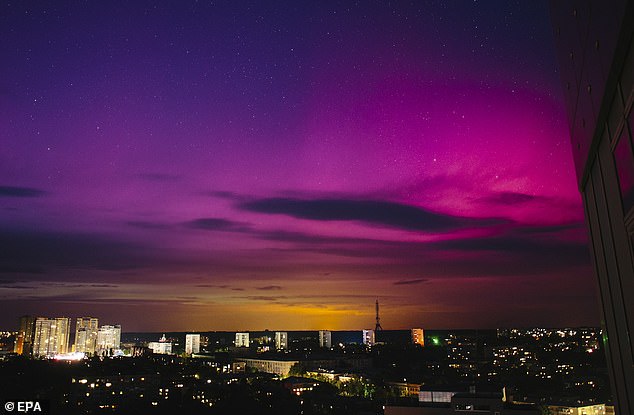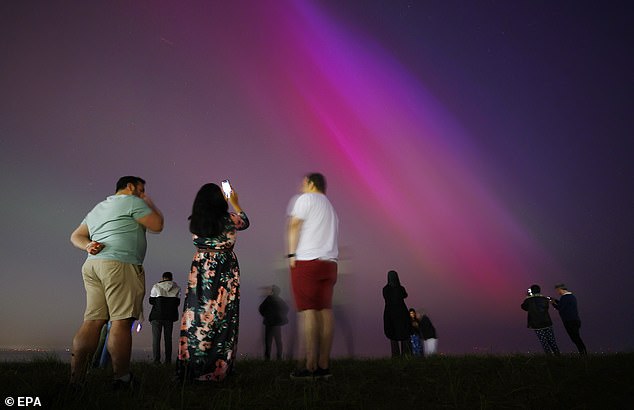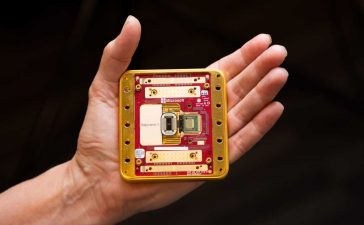Earth has been hit by a solar storm that’s set to be the strongest in 21 years and which could disrupt power lines as well as communications.
The storm was recorded as being of G5 (geomagnetic 5) strength by satellites around 8pm Friday – the strongest level available. It’s the first G5 level storm since October 2003.
A tweet from the NOAA Space Weather Prediction Center said: ‘Extreme (G5) geomagnetic conditions have been observed!’
The solar storms are set to last all weekend and pose a potential threat to power grids. They could cause widespread electrical disruptions, blackouts and damage to critical infrastructure. GPS devices are especially vulnerable and could experience major issues.
The solar storm has already produced stunning auroras, which have been seen around the world.

A view of the sun earlier on Friday as a severe solar storm was unleashed that’s set to batter the United States all weekend

An aurora in the sky above Kharkiv, Ukraine, where Russian forces have attempted a surprise ground offensive

The aurora is also visible in England, where this picture was taken under a famous sculpture at Crosby Beach in Merseyside
According to the NOAA, the optimal places from which to watch the aurora are in the far northern latitudes, including Sweden, Norway, Finland, Iceland, Greenland, and Northern Canada.
The aurora has been spotted in countries around the globe. Because of the increased solar activity, even the ‘southern lights’ have been visible in countries like New Zealand.
The solar storm is a result of six streams of plasma that have burst from the sun and are hurtling toward Earth.
Now that the streams of plasma are roughly one million miles from the planet, scientist are able to gauge the severity of the storm.
The NOAA Space Weather Prediction Center released an update that said the geomagnetic storm was going to be a 6 on the K-index, which is a scale that quantifies the disturbances in the Earth’s magnetic field. The scale ranges from 0, which is calm, to 9, which is severe.
A 6 is considered a moderate geomagnetic storm, which means that power systems located at high latitudes are especially vulnerable and can experience emergency situations.
If this particular geomagnetic storm should prove long, transformers and other electrical equipment could suffer damage.
The NOAA’s current forecast is higher than their previous prediction, which was a 5.
Dr. Tamitha Skov, a space weather physicist with the NOAA, announced that the geomagnetic storm was a G5 on the Hp30 index, which is a scale like the K-index, but it measures disturbances in shorter windows (30 minutes versus three hours).

A few hours ago, the NOAA updated their prediction and said that the geomagnetic storm was exhibiting G5 conditions

Earlier in the evening, the NOAA had predicted a G4 geomagnetic storm, a less extreme scenario
A G5 storm would represent an extreme geomagnetic storm, a possibility that would be replete with serious problems and inconveniences.
At the farthest end of the index, a G5 would entail serious transformer damage and widespread blackouts.
High-frequency radio communications could possibly be rendered incapacitated for a few days.
And satellite navigation services, such as GPS, could be off-line for several days.
Dr. Skov wrote that time would ‘tell if this #solarstorm has the punch to cause the (K-index) to reach G5 as well.’
Scientists have also predicted that three of the six streams, known as coronal mass ejections (CMEs), could combine to create a powerful ‘cannibal CME.’

On the K-index (a scale that quantifies disturbances in the Earth’s magnetic field) the geomagnetic storm rates a 6, which is considered moderate

Auroras are created when energy and particles from the sun temporarily interrupt Earth’s magnetosphere, creating a geomagnetic storm. This is a photo of the aurora taken early Saturday morning in northern Germany

On Friday night, the aurora was visible in Manchester, England
Geomagnetic storms take place when high-energy particles released from solar flares ejected by the sun reach Earth.
The sun is continuously erupting and hurling particles into space, but given that its 93 million miles from Earth, it rarely reaches us.
‘We anticipate we will get one shock after another. We are really buckling down here,’ Clinton Wallace, director of NOAA’s Space Weather Prediction Center (SWPC), said during the Friday media briefing.
When the sun emits a solar flare, it creates an electromagnetic pulse (EMP) similar to that of a nuclear bomb which in turn can disable or destroy all electronic equipment, including satellites.

In Crosby, England, spectators gathered outside to marvel at the Northern Lights

The breathtaking phenomenon was also visible in Ireland, where this photo was taken

The Northern Lights pulsed over Fistral Beach in Cornwall
Auroras are created when energy and particles from the sun temporarily interrupt Earth’s magnetosphere, creating a geomagnetic storm.
Some solar particles travel along our planet’s magnetic field lines into the upper atmosphere, activating nitrogen and oxygen molecules and beaming photons of light in different colors.
Friday’s geomagnetic storm is the result of several explosions on the sun, called coronal mass ejections.
These are large clouds of solar plasma and magnetic field.
Late Thursday night, the NOAA issued a Severe (G4) Geomagnetic Storm Watch, noting a a large sunspot cluster had produced several moderate to strong solar flares since Wednesday.
Sunspots are cooler parts on the sun’s surface caused by massive changes in our star’s magnetic field.
Often bigger than planets, sunspots appear dark on the sun’s surface because they are cooler than other parts – although they’re still very hot, around 6,500°F.

In Cumbria, eager aurora-watchers gathered outside on Friday evening to observe the natural spectacle

Friday’s geomagnetic storm is the result of several explosions on the sun, called coronal mass ejections
The NOAA said that the geomagnetic storm was ‘a giant’ because of two colossal sunspot clusters: one in the northern hemisphere of the sun and another in the southern hemisphere.
Sunspot AR3664, which released flares this week, is more than 124,000 miles across – about 16 times the diameter of Earth.
NOAA explained that GPS could see the most disruptions.
Rob Steenburgh, Space Scientist for SWPC, said: ‘In the most severe cases, you’ll see an actual loss of lock, so the so the receiver will lose lock on the satellite, and then that information that navigation of this navigation and timing information will be unavailable until it is able to reestablish the lock.
‘So outage, with any luck, should not be prolonged.
It’s going to depend on the number of spacecraft that are available to connect to the receiver and where they are on the horizon.’

Geomagnetic storms take place when high-energy particles released from solar flares ejected by the sun reach Earth
NOAA said that people should prepare as they would for a power outage – batteries, flash lights and generators.
However, the agency has been intact with infrastructure operators in preparation for the geomagnetic storm.
‘[People] won’t have to do anything. And if everything’s working like it should, will be stable they’ll be able to go about their their daily lives,’ said Steenburgh.
Developing story, check back for updates…












